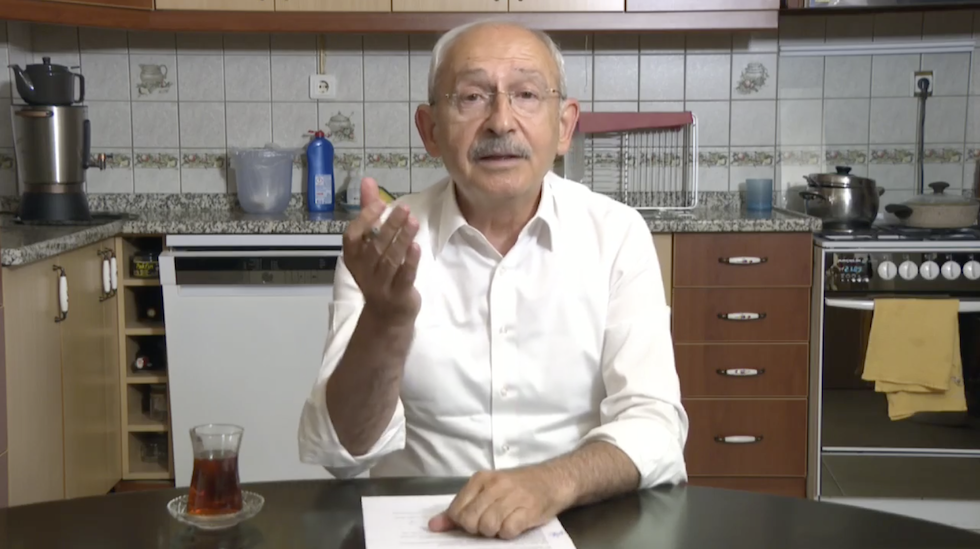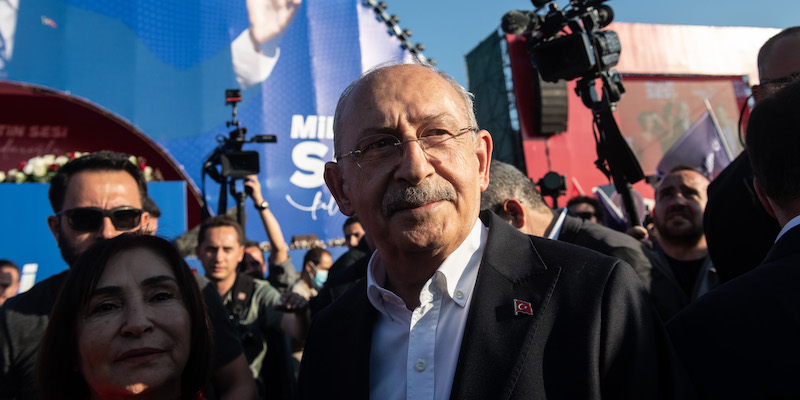In early March, six Turkish opposition parties, meeting in what has been called the “Table of Six”, chose a single candidate to challenge President Recep Tayyip Erdogan in the presidential elections to be held in May: it is Kemal Kilicdaroglu, the leader of the Republican People’s Party (CHP), the main opposition party. Kilicdaroglu is 74 years old and has been the head of the CHP for almost 15. He is a very popular politician but not very charismatic, and this is one of the reasons why his appointment was met with some reticence within the opposition coalition itself.
Kilicdaroglu is a politician universally known for his honesty and frugality, who over the years has been able to obtain some important electoral victories despite Erdogan’s progressive and increasingly oppressive authoritarianism, which has gradually reduced and threatened the independence of the media, the judicial system and many other Turkish institutions.
However, Kilicdaroglu’s united candidacy has created great skepticism within his own coalition, to the point of endangering its existence. The Table of Six is extremely diverse and includes parties ranging from the centre-left to the nationalist right, which have coalesced around some reforms of principle (for example: abolishing presidentialism and reducing the concentration of power in the hands of the president) and above all in the name of the last-ditch attempt to oust Erdogan from power, who has held it uninterruptedly for more than twenty years and who has managed to win almost all the elections in which he has participated.
The CHP, Kilicdaroglu’s party, has long been the main Turkish opposition party: it was founded by Mustafa Kemal Atatürk, the “founding father” of Turkey, has centre-left positions and is openly secular. In the polls it is given to about 25 percent of the votes. The second party in the coalition is the secular nationalist right-wing Good Party (IYI), which has less than 15 percent of the vote. IYI is led by Meral Aksener, one of the few leading female politicians in the country who is very charismatic.
On March 3, Aksener withdrew from the coalition arguing that Kilicdaroglu was not a suitable candidate to beat Erdogan, and that it would have been better to nominate Ekrem Imamoglu (of the CHP) or Mansur Yavas (of the IYI), popular mayors of Istanbul and Ankara, winners of the 2019 administrative elections. According to polls, in fact, both Imamoglu and Yavas are more popular than Kilicdaroglu, but neither of them has the same ability to keep the broad coalition of the Table of Six together.
After three very hectic days, Aksener finally decided to rejoin the coalition, when Kilicdaroglu promised that, if elected, he would appoint Imammoglu and Yavas as his vice presidents.
Skepticism
Aksener’s doubts about Kilicdaroglu are shared by many analysts. Recep Tayyip Erdogan is Turkey’s most charismatic politician and one of the most talented speakers of his generation. The public gatherings of him, he wrote recently theEconomist, have the exalted atmosphere of rock concerts. On the contrary, Kilicdaroglu has a very modest manner, he is a mediocre speaker and his speeches seem more like the lessons of a good professor.
In fact, Kilicdaroglu is more of a bureaucrat than a politician: despite coming from a family of very humble origins, he graduated in Economics from one of the most prestigious universities in Ankara, the Turkish capital, and spent most of his career in the state bureaucracy. Only in 2002, at the age of 54, was he elected to parliament and began a gradual climb up the ranks of the CHP.
Kilicdaroglu became head of the CHP and of the opposition to Erdogan in 2010, but since then he has mainly achieved electoral defeats: his party has maintained stagnant consensus for a long time, and has never managed to offer a convincing alternative to the current president.
Another characteristic that could make Kilicdaroglu a weak candidate is his ethnicity and religion: he is an Alevi, that is, belonging to an ethnic minority who practices a decidedly secular version of Islam, and who does not share some of the rites of Sunni Islam, the one by far prevalent in Turkey. The fact that Kilicdaroglu belongs to a minority is seen by some as a possible weakness, especially towards the more conservative Sunni electorate.
Furthermore, Kilicdaroglu has always had a rather moderate and resigned attitude in opposition to Erdogan, and has been accused of not being decisive and aggressive enough.
In 2014, he chose not to run for president against Erdogan and let Ekmeleddin Ihsanoglu, a centre-right intellectual, go on, who also lost rather badly. In 2017, after the approval of a constitutional referendum that guaranteed Erdogan exceptional powers, it was Kilicdaroglu who convinced opposition militants not to take to the streets to protest, for fear that there could be violent clashes.
Optimism
Kilicdaroglu’s all in all passive and resigned leadership as leader of the opposition was revitalized in 2017: in that year his deputy, Enis Berberoglu, was sentenced to 25 years in prison on charges that in all likelihood were politically motivated, in the It was part of a wider wave of arrests and repression that followed the attempted coup against Erdogan the year before.
That time, in quite surprising wayKilicdaroglu decided to react strongly: he condemned Berberoglu’s arrest with extreme harshness and announced that he would make a great peaceful protest march from Ankara to Istanbul, a journey of over 450 kilometers that he would cover on foot, taking almost a month. The march, called the “March for Justice”, was extremely popular and Kilicdaroglu was able to attract thousands of people to the rallies he held at each stop. In this way his public profile improved considerably.
After the “March for Justice” Kilicdaroglu was given the nickname of Gandhi: both for a slight physical resemblance, and for his always very calm attitude, and above all because Gandhi too, in 1930, had made a much more famous peaceful march for independence of India. Since then Kilicdaroglu has become famous for these demonstrations of peaceful dissent, symbolic but very effective from the point of view of public consensus.
Last year, in protest against the dramatic increase in electricity prices, Kilicdaroglu stopped paying bills at his home and spent a whole week without electricity, working in the dark lit only by the light of a portable lamp (after a week he started paying again, e the light has returned).
Kilicdaroglu works in the dark at his home in April 2022 (Alp Eren Kaya/CHP via AP)
Kilicdaroglu’s house is another notable element of his public image: he and his wife live in an extremely modest apartment in Ankara, furnished without any luxury and indeed with a certain frugality. In recent months, Kilicdaroglu has started posting on Facebook some videos political theme for his supporters, filming them from his kitchen table. A great many people have noticed from the shot that the kitchen in Kilicdaroglu’s house is exceptionally modest, with furniture a few decades old and all the signs of a normal life without luxuries, with pans on the stove and washing-up liquid left open .
Erdogan, during his mandate, instead had an extremely sumptuous presidential palace built, which has over a thousand rooms.

Kilicdaroglu’s cooking from a video posted on Facebook
Another element in Kilicdaroglu’s favor is the fact that he is unanimously considered an honest person, and this judgment is shared by both his allies and his opponents. Early in his political career Kilicdaroglu became known for major anti-corruption actions against companies and public officials, and even now one of his most convincing promises is to reduce corruption in Turkey.
Furthermore, Kilicdaroglu has shown in recent years that the opposition he leads is capable of defeating Erdogan: in particular, the victory of the opposition in the municipal elections of Ankara and Istanbul, the two main cities of Turkey, generated a lot of enthusiasm in 2019 , also thanks to two very charismatic mayoral candidates (Erdogan then asked for the elections to be repeated, and lost them a second time).
Difficulty
Currently the polls give Kilicdaroglu rather ahead, a about 10 percentage points away by Erdogan, but for the “Table of Six” it will still be difficult to beat Erdogan.
It is true that the Turkish president is rather weakened and that the May elections will be the most fought for a couple of decades: inflation in Turkey is very high, between 50 and 85 per cent depending on the month, and this is seriously harming the Turkish middle class. Erdogan has been heavily criticized for his handling of the terrible earthquake that hit Turkey in February, killing at least 50,000. His increasingly authoritarian management of power is creating growing problems both in Turkey and abroad.
At the same time, Erdogan’s party, the AKP, remains the first in the country, with over 30 percent of the votes (Kilicdaroglu’s CHP has about 20 percent). Erdogan is very skilled in electoral campaigns and tireless in political rallies and has already shown that he is ready to use the power of the state in his favor: in recent months he has pushed through an extremely generous pension reform and has raised the minimum wage several times, in rather obvious attempt to curry favor with the electorate. The government also controls much of the media through friendly businessmen, who can ensure favorable coverage.
Furthermore, the opposition coalition could be penalized by the decision to exclude from the “Table of Six” one of the largest opposition parties, the Peoples’ Democratic Party (HDP), which is left-wing and pro-Kurdish. The HDP is easily above 10 percent of the votes, but its proximity to the autonomy movements of the Kurdish population (who live in south-eastern Turkey) makes it an uncomfortable ally for the “Table of Six”, which also includes nationalists who do not welcome the Kurds and their requests. For this reason, the HDP will participate in the elections alone, and if it were to present its own candidate, it would risk taking away votes from Kilicdaroglu.
